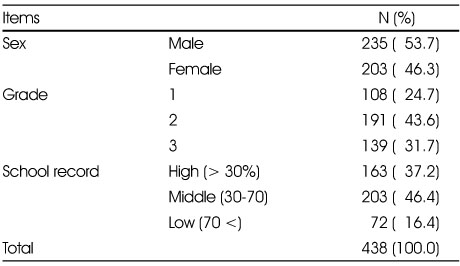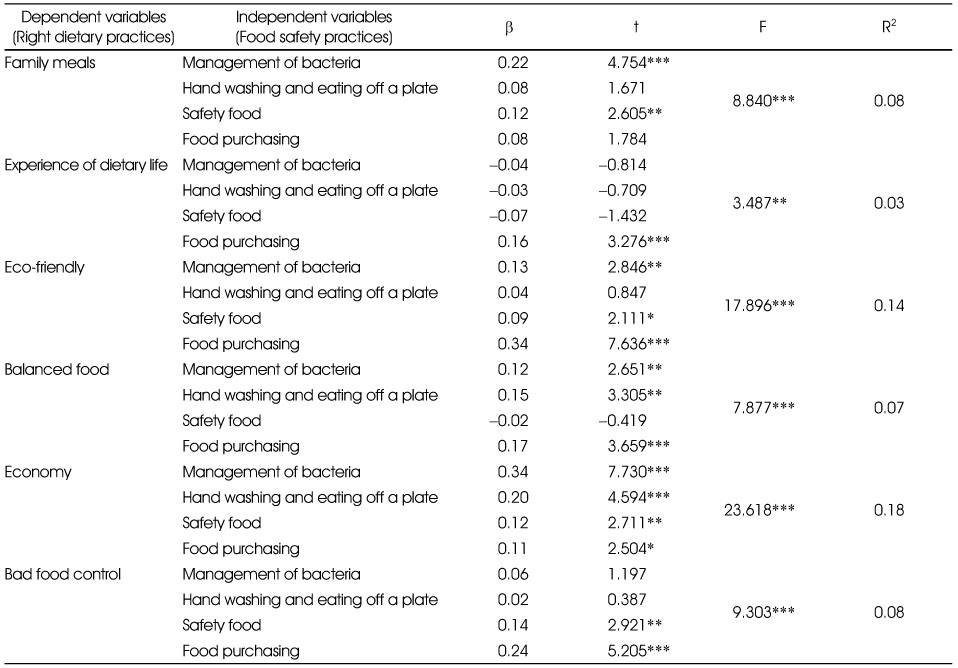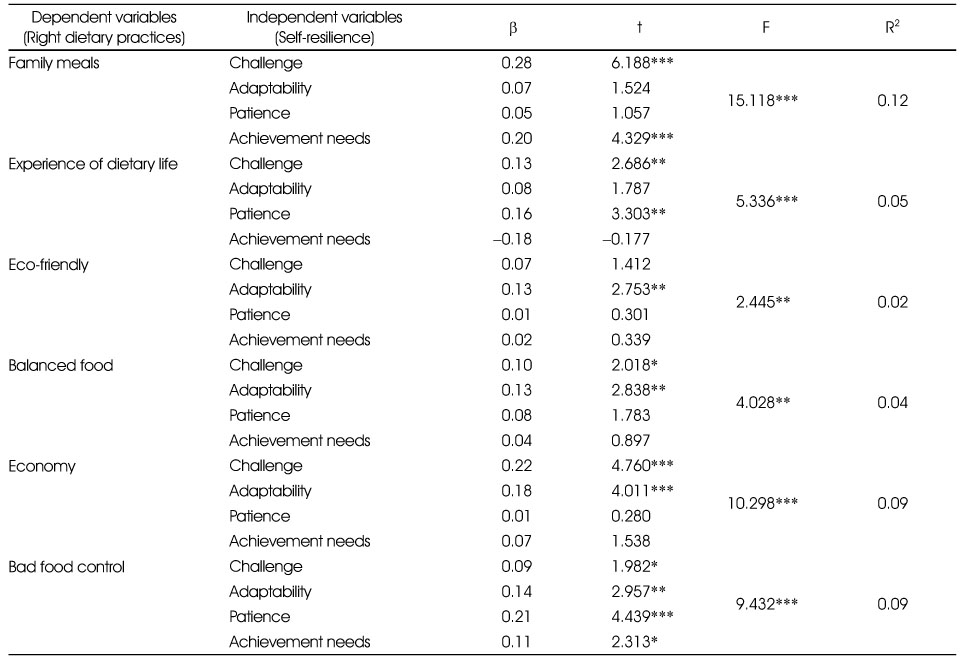Articles
- Page Path
- HOME > Korean J Community Nutr > Volume 20(6); 2015 > Article
-
Research Article
- The Influence of Self-resilience on Dietary Management in Middle School Students
- Yunhwa Kim
-
Korean Journal of Community Nutrition 2015;20(6):399-410.
DOI: https://doi.org/10.5720/kjcn.2015.20.6.399
Published online: December 31, 2015
Department of Family Welfare, Daegu University, Gyeongsan, Korea.
- Corresponding author: Yunhwa Kim. Department of Family Welfare, Daegu University, 201, Daegudae-ro, Jillyang-eup, Gyeongsan-si, Gyeongbuk 38453, Korea. Tel: (053) 850-6810, Fax: (053) 850-6819, kyhwa47@gmail.com
Copyright © 2015 The Korean Society of Community Nutrition
This is an Open-Access article distributed under the terms of the Creative Commons Attribution Non-Commercial License (http://creativecommons.org/licenses/by-nc/3.0/) which permits unrestricted non-commercial use, distribution, and reproduction in any medium, provided the original work is properly cited.
- 1,318 Views
- 0 Download
- 1 Crossref
Abstract
-
Objectives
- This study aims to identify self-resilience factors that drive right dietary and food safety practices in middle school students.
-
Methods
- Data was collected from 438 middle school students in Daegu using a self-administered questionnaire in December, 2013. The questionnaire consisted of 81 items with the following categories: general information, self-resilience, right dietary and food safety practices. Statistical analyses to determine frequency, average, ANOVA, factor analysis, reliability analysis, and regression analysis were performed using SPSS 21.
-
Results
- The results of factor analysis indicated that self-resilience was classified into challenge, adaptability, patience and achievement needs, and right dietary practices were sub-grouped into family meals, experience of dietary life, eco-friendly, balanced food, economy and bad food control, and food safety practices consisted of management of bacteria, hand washing and eating off a plate, safety food and food purchasing. The score of right dietary and food safety practices showed significant differences by sex, grade, and school achievement (p < 0.05). The economy factor of right dietary practices was significantly affected by the management of bacteria (p < 0.001), hand washing and eating off a plate (p < 0.001), safety food (p < 0.01), food purchasing of food safety practices (p < 0.05). The challenge factor of self-resilience significantly affected family meals, experience of dietary life, balanced food, economy, bad food control, management of bacteria, hand washing and eating off a plate, and safety food (p < 0.05). The adaptability factor of self-resilience was associated with factors such as eco-friendly, balanced food, economy, bad food control, management of bacteria, hand washing and eating off a plate, and food purchasing (p < 0.05).
-
Conclusions
- This study suggests that dietary education programs for middle school students could incorporate food safety practices, and self-resilience such as challenge, adaptability, patience and achievement needs to be effective.
- 1. Losasso C, Cibin V, Cappa V, Roccato A, Vanzo A, Andrighetto I. Food safety and nutrition: Improving consumer behaviour. Food Control 2012; 26(2): 252-258.Article
- 2. Kim MJ, Song SJ, Park SH, Song YJ. The association of snack consumption, lifestyle factors, and pediatric obesity with dietary behavior patterns in male adolescents. J Nutr Health 2015; 48(3): 228-235.Article
- 3. Cho HS, Kim MH, Choi MK. A study on vegetable intakes and dietary habits of middle school students in Chungnam. Korean J Community Nutr 2010; 15(4): 525-535.
- 4. Kim MH, Kim HY, Yeon JY. Comparative study on dietary habits, unbalanced diet and intake of food groups in middle school students-by gender and region-. J East Asian Soc Diet Life 2015; 25(1): 1-11.Article
- 5. Lim YS, Park NR, Jeon SB, Jeong SY, Tserendejid Z, Park HR. Analysis of weight control behaviors by body image perception among Korean women in different age group: using the 2010 Korea national health and nutrition examination survey data. Korean J Community Nutr 2015; 20(2): 141-150.Article
- 6. Shin SM. The association of unhealthy eating habit with students of high schools in Seoul. J Korean Soc Sch Health 2015; 28(1): 31-37.Article
- 7. Lee SH. Development and application of practical problem-based lesson plan for improving green dietary life. Korea Assoc Future Educ 2013; 3(2): 19-39.
- 8. Park CK. Effective response against unsanitary food crime. Korean Criminol Rev 2013; 24(2): 113-146.
- 9. Yoon JS, Kim HC, Kim MR. Analysis on knowledge, behaviors, and educational content need regarding green dietary life among middle school students in Daegu and Gyeongbuk region. J Korean Home Econ Educ Assoc 2013; 25(4): 13-27.
- 10. Kim ES, Cho HJ, Kim YH. A study of the relationship of green dietary education, self-esteem and happiness of middle school home economics students. J Korean Home Econ Educ Assoc 2015; 27(3): 63-77.
- 11. Ministry of Education. The course of education [internet]. National Curriculum Information Center; 2013; cited 2015 Sep 15]. Available from: http://ncic.go.kr/.
- 12. Cheong HS, Lee HR. A study on the conditions of the nutrition educations and the perceptions of the nutrition teachers and dietitians in the primary and secondary schools in Gyeongnam area. J Basic Sci 2013; 30(1): 41-59.
- 13. Yang SJ, Chae JH, Yu NS, Park MJ. The analysis of duplicated contents of 'food and nutrition unit' of Home Economics and other subject textbooks for the middle school students. J Korean Home Econ Educ Assoc 2015; 27(1): 31-50.
- 14. Kim JN, Lim GH, Moon JY. The teacher's authority from the point of fusion. Philos Educ 2015; 55(1): 1-22.
- 15. Ministry for Agriculture Food and Rural Affairs. Right dietary [internet]. 2010; cited 2013 Dec 10]. Available from: http://www.greentable.or.kr/.
- 16. Kim JH. Education of healthy living for eradicating unsanitary food. Proceedings of 2013 Winter Conference of the Korean Home Economics Education Association; 2013 Nov 30; Gwangju. p. 55-75.
- 17. Jeon Ch. Research the improvement for cracking down on substandard food violations. J Korea Contents Assoc 2014; 14(7): 169-177.
- 18. Park SY, Lee CH, Nam MW, Cha SB, Park HJ, Chae KH. The effect of food safety e-learning content on educational achievement. Soc Korean Agric Hum Resour Dev 2009; 41(3): 41-62.
- 19. Block JH, Block J. The role of ego-control and ego-resiliency in the organization of behavior. In: Collins WA, editor. Minnesota symposia on child psychology. Hillsdale, NJ: Erlbaum; 1980. p. 39-101.
- 20. Goo JE. Relationships between self-resilience, positive emotion, social support and adolescents' adjustment in family life · school life [master's thesis]. Pusan National University; 2000.
- 21. Kim PM, Kim YH. An effect of self-perception toward healthrelated problem on the self-esteem of youth - Focusing on the moderating effect of ego-resilience. Korean J Youth Stud 2013; 20(10): 143-167.
- 22. Kim SA, Min KH. Comparison of three resilience scales and relationship between resilience and emotional characteristics. Korean J Soc Psychol 2011; 25(2): 223-243.
- 23. Haapala I, Probart C. Food safety knowledge, perceptions, and behaviors among middle school students. J Nutr Educ Behav 2004; 36(2): 71-76.
- 24. Brennan M, McCarthy M, Ritson C. Why do consumers deviate from best microbiological food safety advice? An examination of 'high-risk' consumers on the island of Ireland. Appetite 2007; 49(2): 405-418.PubMed
- 25. Wilson-Barlow L, Hollins TR, Clopton JR. Construction and validation of the healthy eating and weight self-efficacy (HEWSE) scale. Eat Behav 2014; 15(3): 490-492.
- 26. Fitzgerald A, Heary C, Kelly C, Nixon E, Shevlin M. Self-efficacy for healthy eating and peer support for unhealthy eating are associated with adolescents' food intake patterns. Appetite 2013; 63(1): 48-58.
- 27. Lee IW, Kim JH. Improvement of adolescents' obesity through physical activity and self-resilience program. J Korean Soc Sport policy 2013; 11(1): 45-55.
- 28. Barbero AH, López de Mesa MR, Azcona San Julián C. Influence of overweight on the health-related quality of life in adolescents. An Pediatr(Barc) 2015; 82(3): 131-138.
- 29. Min DI. A study of the effect of family strength and ego resilience upon adolescents' school adjustment [master's thesis]. Inha National University; 2007.
- 30. Sanlier N. The knowledge and practice of food safety by young and adult consumers. Food Control 2009; 20(6): 538-542.
- 31. Nunnally JC. Assessment of Reliability. 2nd ed. New York: McGraw-Hill; 1978.
- 32. Yru YS. A study on actual conditions and prevention of school violence. J Korean Teach Educ 2012; 29(4): 615-636.
- 33. Park MO. An analysis of implementing the volume-rate food waste disposal system in Korea: Focused on policy target group compliance. Korean Gov Rev 2015; 22(1): 161-194.
- 34. Seo SH, Ryu KM. Perception of foodborne illness prevention and personal hygiene practice. Korean J Food Cookery Sci 2008; 24(3): 294-303.
- 35. Shin JY. A study of the effect of parents' child-rearing attitude perceived by children on ego-resilience of students in middle school [master's thesis]. 2004. Catholic University of Daegu.
- 36. Strayer J, Roberts W. Children's empathy and role taking: child and parental factors, and relations to prosocial behavior. J Appl Dev Psychol 1989; 10(2): 227-239.
- 37. Kim NE. The relationships among stress, resilience, and quality of life in college students. J Adolesc Welf 2011; 13(4): 1-19.
- 38. Bae SH, Kim KS. The effects of the gratitude education program on the children's ego-resilience and learning attitude in elementary school students. Korean J Elementary Couns 2013; 12(1): 49-67.
- 39. Ewert A, Yoshino A. The influence of short-term adventurebased experiences on levels of resilience. J Adventure Educ Outdoor Learn 11(1): 35-50.
REFERENCES
The score of self-resilience, right dietary practices, and food safety practices by general characteristics of the subjects

Figure & Data
REFERENCES
Citations

- Exploring the connection between ego-resiliency and health behaviors: a cross-sectional study of Polish health sciences students
Małgorzata Dębska-Janus, Paweł Dębski, Agnieszka Nawrocka, Jacek Polechoński, Wojciech Madejczyk, Karina Badura-Brzoza
BMC Psychiatry.2024;[Epub] CrossRef
General characteristics of the subjects
Factor analysis for self-resilience of the subjects
1) Mean±SD is the score of self-resilience, after factor analysis.
Factor analysis for right dietary practices of the subjects
1) Mean±SD is the score of right dietary practices after factor analysis.
Factor analysis for food safety practices of the subjects
1) Mean±SD is the score of food safety practices after factor analysis.
The score of self-resilience, right dietary practices, and food safety practices by general characteristics of the subjects
1) Mean±SD is the score of self-resilience, right dietary practices, and food safety practices after factor analysis.
*: p < 0.05, **: p < 0.01, ***: p < 0.001, Significant difference by Duncan test
The effect of food safety practice factors on right dietary practices of the subjects
*: p < 0.05, **: p < 0.01, ***: p < 0.001
The effect of self-resilience factors on right dietary practices of the subjects
*: p < 0.05, **: p < 0.01, ***: p < 0.001.
The effect of self-resilience factors on food safety practices of the subjects
*: p < 0.05, **: p < 0.01, ***: p < 0.001
1) Mean±SD is the score of self-resilience, after factor analysis.
1) Mean±SD is the score of right dietary practices after factor analysis.
1) Mean±SD is the score of food safety practices after factor analysis.
1) Mean±SD is the score of self-resilience, right dietary practices, and food safety practices after factor analysis. *: p < 0.05, **: p < 0.01, ***: p < 0.001, Significant difference by Duncan test
*: p < 0.05, **: p < 0.01, ***: p < 0.001
*: p < 0.05, **: p < 0.01, ***: p < 0.001.
*: p < 0.05, **: p < 0.01, ***: p < 0.001

 KSCN
KSCN







 Cite
Cite


